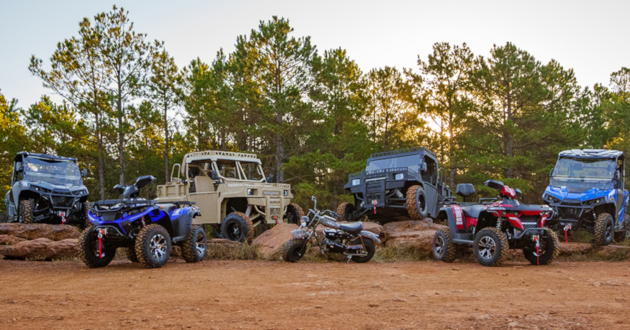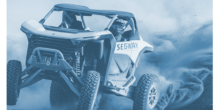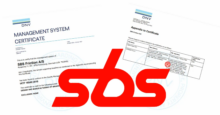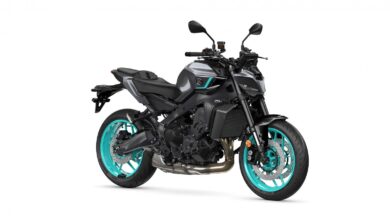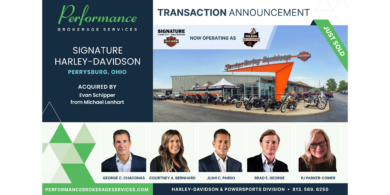An interview with Ducati’s Mike Lock
By Genevieve Schmitt, Contributing Writer
EDITOR’S NOTE: Michael K. Lock took over as chief executive officer of Ducati North America in February 2003. Prior to that, he held the title of managing director of Ducati UK. When he took over as CEO, the company had just relocated its North American headquarters from Pompton Plains, N.J., to Cupertino, Calif., its single largest market in North America. During the last 16 months Lock’s primary goals have been to reestablish Ducati operations in North America while reshaping the image of the brand. His 33 staff members, half of which are based in the field, service180 dealers in the U.S. and Canada. Genevieve Schmitt met with Lock to discuss his progress in rebuilding Ducati’s North American sales. Here is a summary of that discussion, edited for brevity and clarity.
POWERSPORTS BUSINESS: What was the state of Ducati North America when you took over as CEO?
Michael Lock: When I arrived, the company had been through a hard time. The company had decided to move North American operations from New Jersey to California to be closer to the west coast market, which is our largest.
But the way the move had been executed had really thrown the company into chaos. It had lost the services of most of the experienced East Coast staff because they’d either chosen not to move to the west coast or had not been offered the opportunity. There was a new head office team when I got here many of whom had no direct experience with Ducati motorcycles. In fact some had not even worked in the motorcycle industry. That was a bit of a challenge.
PSB: How were the Ducati dealers in North America affected by the move?
Lock: The dealer network was very troubled. They had been put out operationally by a lot of the consequences of the move, new computer systems, new parts warehouse, new bike distribution, new administration paperwork. The dealer network was in a difficult state. And the company had far too much inventory, most of it the wrong kind through poor management and model planning and importation, so it was a bit of a mess in February last year.
Plus, it coincided with the first period in the street bike market in 10 years where the market had contracted. I think everyone had forgotten what you do in difficult times. There had been so many everlasting increasing sales that there was a pinch and it wasn’t only hitting us, it was hitting all the manufacturers. We were not very well placed to be responsive to market conditions.
PSB: Is the move to California working out?
Lock: Yes, but it’s been damned painful getting there. California makes up about 20 % of the U.S. street bike market. By far, it’s the most significant single state. However for Ducati, it makes up nearly 30%, so we are disproportionally reliant on sales in California and what’s going on in California, and then feeding that information back to Europe.
We expected the move would improve our performance here with the head office being based here. What we hadn’t figured on is that we would see an improvement in our business in many other markets as well. We are significantly up in Washington State since we moved here. We are significantly up in Oregon, significantly up in Utah, Arizona and Nevada.
There is a kind of halo effect from being here, being so close to the dealer network and events that go on as well as being so close to the public. We’ve been more responsive to what they’ve wanted and we’ve done well accordingly.
PSB: Why do you feel you need to reshape Ducati’s image here?
Lock: We have done a tremendous amount of research to understand what our position is
in North America, and we’ve come to some
conclusions.
If you speak to motorcyclists all over the nation they all have an opinion of us. People can describe the Ducati brand very articulately. They can’t do that with every manufacturer. If you ask them to describe any of our mass market competitors, they struggle beyond telling you where the bike comes from and the fact that they are involved in lots of market sectors. But with Ducati, people tell you how they feel about the brand.
That for us is a double-edged sword. It is very good we have the recognition, but we have to analyze what people are saying about it. People describe Ducati in North America as race bred, which we are, of having strong heritage, of being successful on the race track, that’s all good; of being Italian, they have an idea that we’re a European motorcycle manufacturer. So far so good.
However when it goes on to other aspects of the brand, we find some limitations for us to develop the business on the basis of what people think of us. We traveled the whole country to go to motorcycle shows and talk to people and everybody has the impression that our motorcycles are expensive and unobtainable. People will talk very freely and say, ‘You guys are the Ferrari of motorcycles,’ which really winds me up. Last time I looked you have to be a millionaire to buy a Ferrari, it’s a very, very exclusive club.
That’s not the case with us. You can buy a Ducati for less than $7,000. That is a mass market Japanese bike price. What we are is a specialist manufacturer, not an exclusive manufacturer. That is a big message to get across. We sell two motorcycles in our range over $25,000, and total sales of those motorcycles are about 400 units a year in the U.S., and we sell 7,000 bikes.
So, the super exclusive hand-built high performance end of our market is one aspect of what we do. It is not how we make our living. We have a big job to do in the U.S. of repositioning the brand, of not being the Ferrari of the motorcycle industry.
PSB: How has this viewpoint affected sales?
Lock: I looked at our performance over the last four or five years and we sell approximately the same number of motorcycles every year in the U.S. whatever we do to the range. I’ve come to the view that that is because the market has taken a position on us. There are people who are in the brand, who buy our bikes, then there are people on the outside looking in who would love to buy our bikes but feel our bikes are unobtainable for one reason or another. That’s probably our biggest challenge here in North America.
PSB: What is your first step to change that?
Lock: We are taking our brand to the racetracks of North America. The view in the market is that we are a company that races in Grand Prix with a multimillion dollar budget, dominated World Superbike, which is glamorous at the international level, but that Ducati is not really interested in national racing. We haven’t fielded a factory-backed team in North America since 1999. The message we put out is that we had abandoned AMA Superbike racing, that it’s rather beneath us.
I felt that was a tragic mistake. We have put a factory Superbike team back on the racetrack here in North America. To have our first win since March 1999 on American soil is a big deal for this company
What this shows now is that we not only race all over America where people can see our bikes, but we open up the paddock. If you are a Ducati owner, you can come and show the key to your bike and have lunch with us, drop off your gear so you don’t have to carry it around with you; you can buy merchandise, and you can hang out with other Ducati customers. This is all free of charge. This is what we’ve done in Europe for years, and what it says is, ‘If you join Ducati you become a Ducati rider, you’re not just buying a Ducati product that has two wheels and is red in the middle. You’re joining a part of a philosophy, an outlook in the motorcycle industry and a uniqueness.’ We put a lot of effort not only in the trackside promotion of AMA, but the off-track as well.
PSB: Describe what that “off-track” promotion entails.
Lock: Well, Eric Bostrom has done 10 dealer events already this year. In addition to learning a new bike with new tires and working with a new team, he’s out almost every weekend somewhere in the country. It’s very
important to us that we make our company accessible again. Another thing we’re doing is we’re developing partnerships with motorcycle track schools. This year we’ve taken over the headline sponsorship for the Penguin Racing School in New Hampshire during summer and down in Florida in winter.
We not only have people who do track schools and want to improve their skills doing it on a Ducati, but we also can do promotions with dealers in New England. So when they sell a bike we can do special discount deals. We’ve used this as a pilot to see how it works. I’m planning next year to take alliances with reputable track schools all across the country.
PSB: How do you plan to attract people not interested in racing at all?
Lock: The core of the company has always been Superbike and I think it always will be. However, to go to a wider audience requires us to invest in lots of other things.
In the last year, we’ve launch a very interesting new bike which is taking us to a completely new segment, that is the Multistrada. This is effectively a sportbike that you can sit upright on and tour on all day. It’s our number two best-selling bike in the range. It’s opened up a completely different segment for us. It’s given the option for people who buy normally much more conservative bikes like BMWs or Triumphs, access into Ducati.
Second, of course, is the Monster series, which has always been a top seller for us when they came out in 1994. We carried on developing the bikes — the 600 became the 620, the 750 became the 800, the 900 became the 1000 and so on, and the bikes have become more sophisticated. They’re all fuel injected; they all have the lightweight clutch on them. The bikes are becoming easier to ride and more accessible for people. We’ve invested and reinvested in the Monster line because it’s become a real icon for us.
PSB: Describe Ducati’s relationship now with its dealers in North America.
Lock: We’ve spent the last year trying to recover our service. I think, as a company, it’s fair to say we dropped the ball. We did not supply dealers over the last 24 months with the service they need and deserve in order to represent our brand well.
We spent the last 12 months and we’re spending the next 12 months recovering that service. By that I mean delivery of parts, process of warranties, information technology systems the dealers use, service from our field staff, and so on.
I think by the end of 2004 we will be in a position where we can hold our head up. I think we’re nearly there now.
Then, at the end of August, we’re taking all of our North American dealers to the Barber racetrack in Alabama to do our dealer meeting in that beautiful museum there. Then we’ve hired the circuit for a couple of days where the dealers can ride all the new 2005 bikes. We’ve never done this before. We’ve never treated the dealers like family. We’ve always treated them like dealers and that was a mistake. psb
Genevieve Schmitt is the editor of Woman Rider magazine, an Ehlert publication and a contributing writer for Powersports Business.


